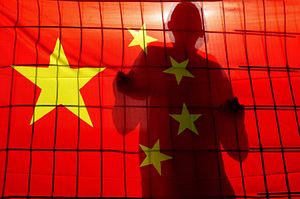In a fine recent study of China’s human rights lawyers, Eva Pils, a scholar of Chinese legal issues, points out that once the behemoth of the Chinese state takes interest in you these days, there can be literally no escape. Those who stray over into the vast terrain where they are viewed as “enemies of the state” are not just subject to violence and torture.
Pils gives a long, sobering list of other things that the predatory state can do: get you fired from your job, get a landlord to terminate your lease so you end up homeless, get internet companies to shut down your blog so you have no voice, and block your child from school admission. These are not theoreticals; unfortunately, there are plenty of credibly documented cases where such things have happened.
In view of these almost limitless powers, the puzzle is not so much why the mighty state is running rampage of late on a handful of rights lawyers and civil society actors in China, but that there are still people with the courage and inner resources to carry on with their dissent. Back in the Maoist period, a dissident might suffer the fate of Zhang Zhixin, who had her windpipes physically cut by prison guards so she could make no noise, and then was executed by firing squad. These days, the tactics are less extreme — but the end result is much the same. Smother someone, eradicate any means they might have for social influence, and in effect bury them alive.
Despite this, a cohort of individuals with unbelievable grit and determination in China are continuing to challenge the state in courts. They show no signs of disappearing. They can take heart from the case cited of Zhang above. Killed in 1975, her story came back to haunt the party, with her rehabilitation only a few years later. She is now regarded as a martyr for the Party cause. Today’s enemies have a nasty habit of ending up as tomorrow’s heroes. The Party knows that better than most, because most of its founding members back in the 1920s ended up this way.
There is a new angle to the current onslaught, however. With what looks like the abduction of figures displeasing to the Party abroad, and the rounding up of foreigners involved with civil society groups in China, suddenly the country’s domestic repression has a strong international dimension. Not so long ago, the worthy attempts by foreign governments and others outside China to express concern about cases of claimed maltreatment of dissidents within the country were met with shrill declarations that these were internal matters, and nosy foreigners should tend to their own affairs. But when China takes its campaign against rights defenders abroad, the game changes.
The detention, televised “confession” and then expulsion of a Swedish national working for an NGO in China in January, along with what looks like the abduction another Swedish citizen originally from Hong Kong from outside China, obviously do become important issues for outsiders, because they involve foreign citizens, and thus touch on important issues such as duty of care and consular obligations. Therefore, for those who have been waiting for a chance to make a clear statement on the dispensation of justice in China — or lack thereof — these recent cases, deeply regrettable though they are, give a new kind of opportunity to forcefully pursue discussion over rights issues.
And when the stonewalling starts (as it almost inevitably will) about these being “internal affairs,” the logical response will be that, obviously, in these cases they aren’t. They involve non-Chinese, people whom foreign governments have a moral and legal obligation to take care of and support. If it does prove true, too, that Chinese state agents have been unilaterally acting abroad, that makes them international actors, and exposes part of their work to international norms and criticisms as never before.
The bad news over the last few months is that we seem to be seeing a wholly new form of the Chinese state acting outside its borders in ways which are opaque, arbitrary, and worryingly predatory. The good news is that never before has the Chinese state line about “non-interference in the affairs of other countries” been so thoroughly eroded. It is deeply desirable that the United States, the European Union (EU), and others now adopt a uniform, principled and consistent line, demand clarification on the cause of these cases, express dismay at their handling, and fulfill their duty to ensure that citizens are protected inside and outside China. In that way, as never before, these internationalize rights cases can serve as exemplars.
































